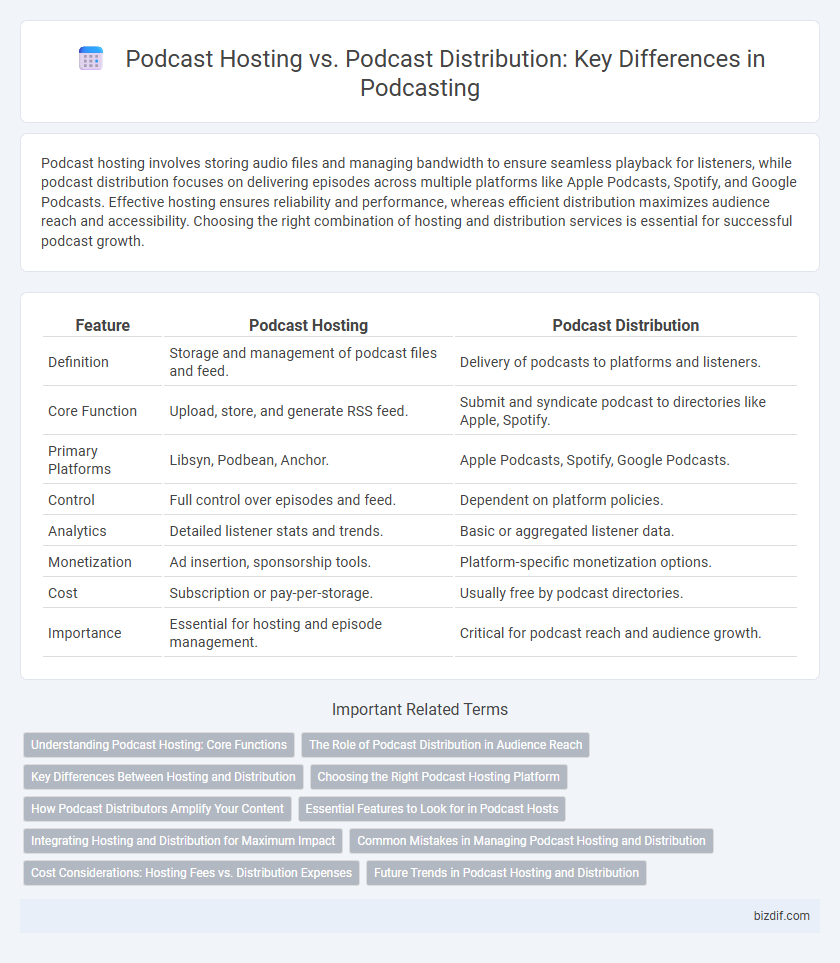Podcast hosting involves storing audio files and managing bandwidth to ensure seamless playback for listeners, while podcast distribution focuses on delivering episodes across multiple platforms like Apple Podcasts, Spotify, and Google Podcasts. Effective hosting ensures reliability and performance, whereas efficient distribution maximizes audience reach and accessibility. Choosing the right combination of hosting and distribution services is essential for successful podcast growth.
Table of Comparison
| Feature | Podcast Hosting | Podcast Distribution |
|---|---|---|
| Definition | Storage and management of podcast files and feed. | Delivery of podcasts to platforms and listeners. |
| Core Function | Upload, store, and generate RSS feed. | Submit and syndicate podcast to directories like Apple, Spotify. |
| Primary Platforms | Libsyn, Podbean, Anchor. | Apple Podcasts, Spotify, Google Podcasts. |
| Control | Full control over episodes and feed. | Dependent on platform policies. |
| Analytics | Detailed listener stats and trends. | Basic or aggregated listener data. |
| Monetization | Ad insertion, sponsorship tools. | Platform-specific monetization options. |
| Cost | Subscription or pay-per-storage. | Usually free by podcast directories. |
| Importance | Essential for hosting and episode management. | Critical for podcast reach and audience growth. |
Understanding Podcast Hosting: Core Functions
Podcast hosting involves storing audio files on a server and providing the necessary bandwidth for listeners to stream or download episodes efficiently. Core functions include managing RSS feeds, ensuring episode availability, and offering analytics on listener behavior and demographics. Reliable hosting platforms optimize file delivery speed and support seamless integration with distribution channels.
The Role of Podcast Distribution in Audience Reach
Podcast distribution plays a crucial role in expanding audience reach by ensuring episodes are available across multiple platforms like Apple Podcasts, Spotify, and Google Podcasts. Unlike podcast hosting, which stores and manages audio files, distribution focuses on delivering content to diverse directories where listeners discover new shows. Effective podcast distribution strategies increase visibility, drive subscriber growth, and maximize audience engagement.
Key Differences Between Hosting and Distribution
Podcast hosting refers to the service that stores and manages the audio files, providing a dedicated space and bandwidth for seamless playback, while podcast distribution involves delivering the podcast episodes to various platforms like Apple Podcasts, Spotify, and Google Podcasts. Hosting platforms generate an RSS feed, which distribution channels utilize to update and syndicate content across multiple directories. Key differences include hosting's focus on storage and technical management versus distribution's role in audience reach and accessibility across devices and apps.
Choosing the Right Podcast Hosting Platform
Selecting the right podcast hosting platform is essential for ensuring reliable storage, fast episode delivery, and robust analytics. Podcast hosting services manage your audio files and generate the RSS feed needed for distribution across platforms like Apple Podcasts, Spotify, and Google Podcasts. Prioritize hosts offering unlimited storage, easy integration with distribution channels, and comprehensive performance tracking to maximize your podcast's reach and growth.
How Podcast Distributors Amplify Your Content
Podcast distributors amplify your content by expanding its reach across multiple platforms such as Apple Podcasts, Spotify, and Google Podcasts, ensuring exposure to diverse audiences. Unlike hosting, which stores and manages your audio files, distribution focuses on submitting and syndicating your episodes to various directories, optimizing discoverability through metadata and categorization. Effective podcast distribution enhances listener engagement by leveraging algorithms and recommendations that connect your show with potential subscribers globally.
Essential Features to Look for in Podcast Hosts
Podcast hosting platforms must offer robust storage capacity, reliable bandwidth, and user-friendly analytics to manage and monitor episode performance effectively. Essential features include seamless RSS feed generation, customizable podcast players, and easy integration with major distribution channels like Apple Podcasts, Spotify, and Google Podcasts. Security measures such as SSL encryption and automatic backups ensure content protection and uninterrupted listener access.
Integrating Hosting and Distribution for Maximum Impact
Integrating podcast hosting and distribution streamlines content delivery by centralizing audio file storage and automating episode syndication across major platforms like Apple Podcasts, Spotify, and Google Podcasts. This synergy enhances audience reach, optimizes SEO through consistent metadata, and simplifies analytics tracking for performance insights. Leveraging an all-in-one podcast platform boosts efficiency, enabling creators to focus on content quality while maximizing their show's visibility and engagement.
Common Mistakes in Managing Podcast Hosting and Distribution
Common mistakes in managing podcast hosting and distribution include selecting unreliable hosting platforms that result in frequent downtime and poor audio quality, which directly impacts listener retention. Many podcasters overlook the importance of accurate RSS feed configuration, leading to delays or failures in episode availability across distribution channels like Apple Podcasts, Spotify, and Google Podcasts. Neglecting to regularly update metadata and analytics hinders the ability to optimize reach and audience engagement effectively.
Cost Considerations: Hosting Fees vs. Distribution Expenses
Podcast hosting involves costs such as monthly or annual fees for storage, bandwidth, and analytics, which vary based on episode quantity and listener volume. Podcast distribution typically incurs fewer direct expenses but may include fees for premium platforms or additional promotional services. Evaluating total cost of ownership requires balancing hosting plans with distribution reach to maximize budget efficiency in podcast production.
Future Trends in Podcast Hosting and Distribution
Podcast hosting platforms are evolving with enhanced analytics, AI-driven content recommendations, and increased integration with social media for seamless audience engagement. Podcast distribution is shifting towards multi-platform syndication, voice-activated search optimization, and adoption of blockchain for content ownership and royalty transparency. Emerging trends forecast a convergence of hosting and distribution services to offer podcasters unified solutions that maximize reach and monetization efficiency.
Podcast hosting vs Podcast distribution Infographic

 bizdif.com
bizdif.com